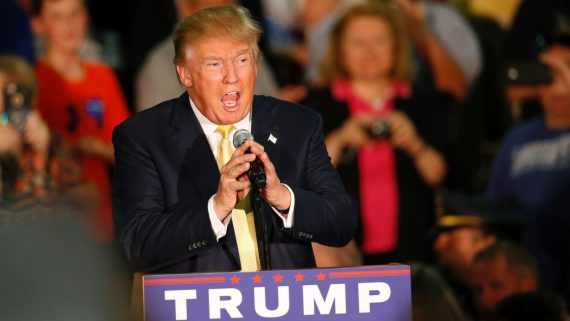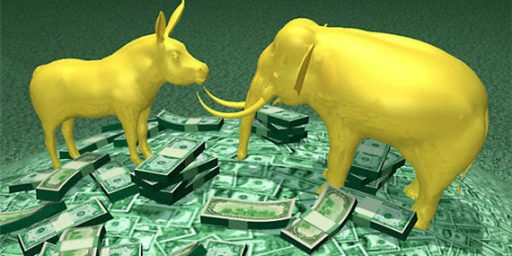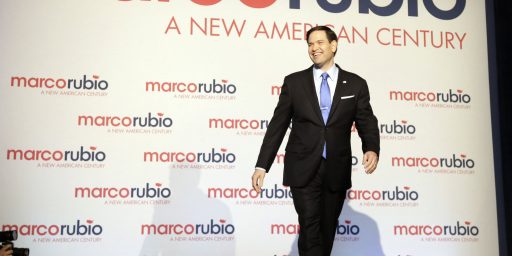Republican Mega-Donors Not Exactly Warming Up To Donald Trump
Some of the GOP's top donors still aren't sold on Donald Trump.
While Republican politicians and, according to the polls, Republican voters seem to be finding a way to reconcile themselves to the fact that Donald Trump is their party’s nominee and rally to his side, a significant portion of top Republican fundraisers are proving much harder to convince, something that could have a huge impact on the General Election campaign:
A powerful array of the Republican Party’s largest financial backers remains deeply resistant to Donald J. Trump’s presidential candidacy, forming a wall of opposition that could make it exceedingly difficult for him to meet his goal of raising $1 billion before the November election.
Interviews and emails with more than 50 of the Republican Party’s largest donors, or their representatives, revealed a measure of contempt and distrust toward their own party’s nominee that is unheard of in modern presidential politics.
More than a dozen of the party’s most reliable individual contributors and wealthy families indicated that they would not give to or raise money for Mr. Trump. This group has contributed a combined $90 million to conservative candidates and causes in the last three federal elections, mainly to “super PACs” dedicated to electing Republican candidates.
Up to this point, Mr. Trump has embraced the hostility of the Republican establishment, goading the party’s angry base with diatribes against wealthy donors who he claimed controlled politicians. And he has succeeded while defying conventions of presidential campaigning, relying on media attention and large rallies to fire up supporters, and funding his operation with a mix of his own money and small-dollar contributions.
But that formula will be tested as he presents himself to a far larger audience of voters. Mr. Trump has turned to the task of winning over elites he once attacked, with some initial success. And he has said he hopes to raise $1 billion, an enormous task given that he named a finance chairman and started scheduling fund-raisers only this month.
Among the party’s biggest financiers disavowing Mr. Trump are Paul E. Singer, a New York investor who has spent at least $28 million for national Republicans since the 2012 election, and Joe Ricketts, the TD Ameritrade founder who with his wife Marlene has spent nearly $30 million over the same period of time, as well as the hedge fund managers William Oberndorf and Seth Klarman, and the Florida hospital executive Mike Fernandez.
“If it is Trump vs. Clinton,” Mr. Oberndorf said, “I will be voting for Hillary.”
The rejection of Mr. Trump among some of the party’s biggest donors and fund-raisers reflects several strains of hostility to his campaign. Donors cited his fickleness on matters of policy and what they saw as an ad hoc populist platform focused on trade protectionism and immigration. Several mentioned Mr. Trump’s own fortune, suggesting that if he was as wealthy as he claimed, then he should not need their assistance.
Among the more than 50 donors contacted, only nine have said unambiguously that they will contribute to Mr. Trump. They include Sheldon G. Adelson, the casino billionaire; the energy executive T. Boone Pickens; Foster Friess, a wealthy mutual fund investor; and Richard H. Roberts, a pharmaceutical executive. Mr. Friess wrote in an email that Mr. Trump deserved credit for inspiring “truckers, farmers, welders, hospitality workers — the people who really make our country function.”
Many more donors declined to reveal their intentions or did not respond to requests for comment, a remarkable silence about the de facto nominee of their party.
Asked how Mr. Trump intended to win over major donors, Hope Hicks, a spokeswoman for the Trump campaign, responded in one sentence. “There is tremendous support for Mr. Trump,” she said.
Some major donors have not explicitly closed the door on helping Mr. Trump, but have set a high bar for him to earn their support, demanding an almost complete makeover of his candidacy and a repudiation of his own inflammatory statements.
“Until we have a better reason to embrace and support the top of the ticket, and see an agenda that is truly an opportunity agenda, then we have lots of other options in which to invest and spend our time helping,” said Betsy DeVos, a Michigan Republican whose family has given nearly $9.5 million over the last three elections to party causes and candidates.
But others simply believe Mr. Trump is unfit to serve in the Oval Office. Michael K. Vlock, a Connecticut investor who has given nearly $5 million to Republicans at the federal level since 2014, said he considered Mr. Trump a dangerous person.
“He’s an ignorant, amoral, dishonest and manipulative, misogynistic, philandering, hyper-litigious, isolationist, protectionist blowhard,” Mr. Vlock said.
Not every Republican donor is closing the door on a Trump campaign, of course. As noted, among those who have already pledged their support are Foster Fries and Sheldon Adelson, both of whom played a big role in fundraising during the primary and General Election phases of the 2012 campaign. Other donors have said that they could change their mind based on how Trump behaves in the coming months and how the race itself proceeds. Others, though, seem to be sounding like Mr. Vlock and rejecting what Trump says and saying that they will either sit the 2016 race out entirely or concentrate their donations and fundraising on down ballot races for the Senate, House, Governor’s mansions, and state legislatures which will also be on the line and, potentially, vulnerable to a backlash against Republicans based an antipathy toward Trump and his campaign by the public at large. If enough donors make a similar decision, then Trump and his campaign could find themselves at a serious disadvantage.
As it stands, it already seems apparent that this is the rare election in which the Democrats are likely to out fundraise Republicans, especially at the level of the Presidential campaign. Indeed, since last year both Hillary Clinton and Bernie Sanders have together raised far more money than all of the Republican Presidential candidates combined. Trump, meanwhile, managed to win the Republican nomination with a minimal amount of fundraising and, indeed, spending a minimal amount of money due to his ability garner free media coverage. That strategy isn’t likely to work for a General Election campaign where funding will be necessary for everything from staffers in all fifty states simultaneously to pollsters to the kind of media campaign that Trump eschewed during the primary season. Trump also boasted that he largely self-funded his primary campaign, but it’s clear that he probably doesn’t have access the the kind of liquid assets necessary to do that for a General Election campaign and in any case has already made clear that he would be seeking donations to fund a General Election campaign where spending is projected to exceed $1 billion. Whether he likes it or not, this means that Trump is going to need the support of people like these donors and others who have proven to be the most reliable sources of fundraising for Republican candidates in the past. The fact that he spent much of the primary season attacking them, therefore, may prove to have been a mistake in retrospect.
Trump supporters will likely dismiss news like this by pointing to the primary campaign and the fact that Trump rather easily defeated a whole series of candidates that raised and spent far more money than he did during the course of the race for the Republican nomination, including Jeb Bush, Ted Cruz, Ben Carson, and Marco Rubio. This isn’t an unfair point, but as I noted above, a General Election campaign is a far different animal from a primary campaign and it will be difficult if not impossible for Trump to adhere to the same “campaign on the cheap” strategy that he followed during the primary. Free media is always a useful thing, of course, and Trump clearly can get access to that in abundance if he wants it, but free media doesn’t pay for the kind of campaign organization that Trump is going to need to effectively compete against Hillary Clinton in swing states such as Florida, Virginia, and Ohio, not to mention the 47 other states in the union, and without an effective fundraising organization it’s not clear how Trump and the GOP are going to finance the kind of campaign they need to be credible in a race against what promises to be a well-organized, well-funded Clinton campaign.





![Elizabeth Warren Pledges [Something, Something] Wealthy Donors](https://otb.cachefly.net/wp-content/uploads/2019/02/elizabeth-warren-campaign-rally-sweater-512x256.jpg)
Build a campaign, make Mexico pay for it.
We all thought the Republican Party would die. Turns out it’s conservatism that’s dead.
The vast majority of voters who described themselves as conservative have rejected one conservative after another, and chose this authoritarian pig instead. That word ‘conservative’ never really meant anything to ‘conservative’ voters, it was always just a white identity thing. What they liked about Reagan wasn’t his conservative ideals, it was his ‘welfare queens’ rhetoric. When George H. W. Bush started getting worried, who came out to play? Willie Horton. That’s the DNA of the modern GOP. 47% of people are leeches, and they’re all brown.
Now suddenly ‘conservatives’ don’t care about free trade, or abortion, or NATO, a non-nuclear far east, or morality or honesty or limited government or any of the crapola the conservative intelligentsia cared about. They just wanted some people to hate, and lots of guns.
Let’s see how big the fall-off is in GOP votes. Let’s see how many who staunchly reject Trump today end up crawling back to him. Whatever that difference is? That’s your actual conservatives. Betcha it’s not 5%, and 90% of those will live within commuting distance of either Washington DC, or New York City.
Whatever the few principled conservatives have been telling themselves the GOP was, they need to wise up. Because you may want to pretend it was a conservative party, but unless you’re deaf and blind you know damn well that it’s a fascist party now.
Mr. Vlock has a way with words 🙂
Turns out Republicans have no principals, and all that matters to them is the quest for power.
Every single thing they’ve been saying forever is total BS.
Even the evangelical zealots are willing to sign onto a serial philanderer and pro-choicer.
This is an amazing thing to watch.
Trump is definitely behind the curve when it comes to fundraising, and it will be fascinating to watch how this all plays out. He’s spent the last 8 months telling his supporters how rich he is. Some of them will contribute, but it’s going to be harder for him to turn around and get ordinary folks to shell out after months of bragging about his deep pockets. I also wonder how effective he is going to be when asking major donors for money (apparently not very effective if this article is a sign of things to come). They like to be courted by the candidates, and I just don’t see Trump going hat in hand to them asking for money–they know him and know that this entire campaign is/was an exercise in self-promotion.
I’d never write him off, that would be foolish–but running a national campaign on a shoestring won’t be effective.
It’s obvious these mega rich donors know a bad investment when they see one.
I t could be that the wealthy donors know a con man when they see one.
Trump will try to turn this around by saying he is so wealthy he can’t be bought which has just enough element of truth to possibly work.
@Facebones:
Many of them have actually met him or know a close acquaintance that has. Know and dislike him on a personal level. He’s the wannabe putz that doesn’t get invited to the party but ends up there anyways. If the asshat down the street (you know, the one who’s always playing Keep Up with the Kardashians regardless of their paycheck) started sniffing around and asking for money to run for President, would you give it to them? These are his supposed peers and they’re keeping their precious cash far far away from this sh^tshow.
@Scott: Yes, he’ll try that.
The problem is, if major donors don’t start writing checks, Trump will either need to loan his campaign more of his money (which he’s already stated he won’t do), or he’ll run into problems very quickly. The RNC won’t be able to fill the gap–candidates are expected to raise money if they decline the federal dollars. He might end up walking back the statement he made earlier about refusing the federal matching if he gets really desperate.
Bottom line is that state field staffs, database experts, direct mail programs, polling operations, GOTV efforts–these all cost money. A lot of money.
I don’t believe fundraising will prove to be Trump’s Achilles heel. I think he’s in a position to be outspent 10 to 1 and still win.
What happens if Trump doesn’t raise enough money for the campaign to pay back the loans he made to the campaign?